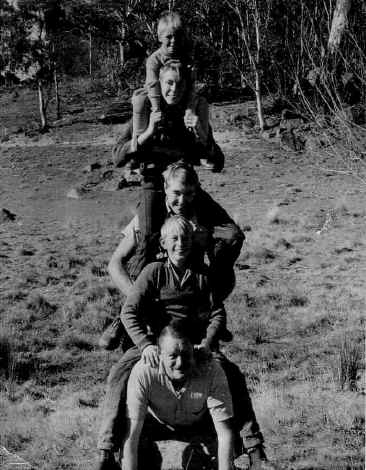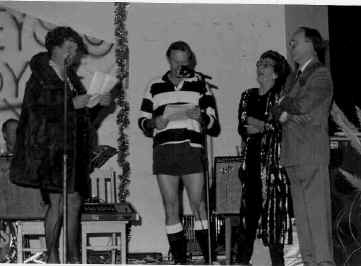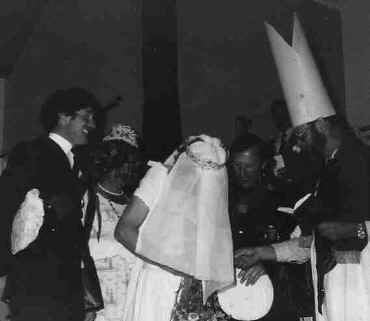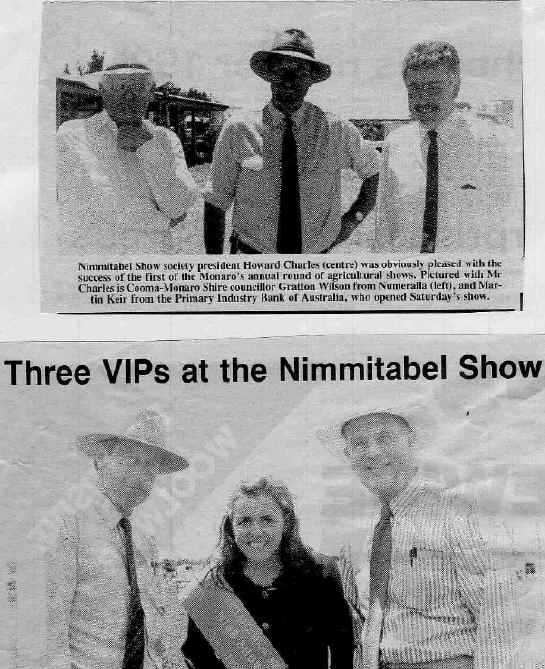
Home | Pioneers | Contact Us | Copyright/Disclaimer
The Charles Family
Gilbert and Betty Charles - Kydrabah
They were made of stellar stuff, Gilbert & Betty Charles, and nowhere was that more evident than in the lives they created there at Kydrabah, some 10 miles from Nimmitabel.
 At some point in his early life, Gilbert discovered trout fishing, and like a creeping drug it overtook him for pretty well the rest of his life, and was the source of great joy to both he and Betty – albeit in her
case by default.
At some point in his early life, Gilbert discovered trout fishing, and like a creeping drug it overtook him for pretty well the rest of his life, and was the source of great joy to both he and Betty – albeit in her
case by default.
Why Kydrabah? Gilbert had only one requirement when they both determined to leave Europe and England for Australia after six long years of war - trout stream, and Kydrabah had seven miles of it. However, Kydrabah was difficult land, and any money it reaped for them was instantly ploughed back into the land or set aside to pay for our education. Dad used to say that every blade of grass on the property was gold-plated.
Despite the difficulties that clearing the property and making it a workable farm for sheep and cattle presented, they were very happy days for our family. Mum often said they were the happiest days of her life. Somehow it really worked, we worked as a team.
For me growing up, it was a little like growing up in the United Nations. We had many Europeans who came out on assisted passage, sponsored by Mum and Dad, from Europe, just after the war.
Just on our property alone, we had a Russian baroness, Dockie; Polish refugees – Johnny and Rosario Belcott, a German Carl Sievers, as well as other Germans whose names I do not know, an Austrian Baron von Richter, Major Atkinson (best known for the books he used to write that never were published) – Uncle Tom Cobblies and all, they were.
Trout steam notwithstanding, there were many challenges for this motley selection in those early days at home, before I was born. The "homestead" was a broken down wooden slab house nearly 100 years old, still inhabited by Frank Clark who was looking after the property for the previous owner, so my parents lived in a caravan for sometime. Tight living for the family for some time – so they embarked on building a rammed earth – Pise - house.
 Dad left most of the farming to my mother, Frank, Howard and the motley crew of Europeans. Dad had found work in Cooma as the Medical Administrative Officer for the Snowy.
Dad left most of the farming to my mother, Frank, Howard and the motley crew of Europeans. Dad had found work in Cooma as the Medical Administrative Officer for the Snowy.
Mum really loved this life – although it involved tremendous hard work, and quite a degree of heartache. Losing animals in floods, newborn lambs dying in the freezing cold, amazing episodes drenching the sheep against fluke and other ravages that dogged the animals.
Dipping the sheep was always a major exercise. It was necessary to wear clothing that was going to be thrown away as there was some sort of aresnic in the dip. These occasions were my first memories of the Nimmitabel community helping each other out. Our neighbours, the Alcocks, always helped.
Johnny Alcock and his Mum, Dot, as well as other members of their family always pitched in. One priceless time, Dot arrived to dip the sheep in her ball gown – it certainly was an amazing outfit for such an occasion, and perhaps scared the sheep into submission – they darted into the race before plunging into the dip with great alacrity.
 Clearing the paddocks of serrated tussocks was a major undertaking. When the boys came home from boarding school, Mum and Dad got them to work on this project by offering an incentive. 5p per tussock was offered. It is perhaps little wonder that my middle brother, Arthur or Penny as we have always known him, ended up a most successful merchant banker and business man in Sydney. His practice in
this project was to split each of the tussocks he pulled up, thus doubling the earnings of his brothers with the greatest of ease.
Clearing the paddocks of serrated tussocks was a major undertaking. When the boys came home from boarding school, Mum and Dad got them to work on this project by offering an incentive. 5p per tussock was offered. It is perhaps little wonder that my middle brother, Arthur or Penny as we have always known him, ended up a most successful merchant banker and business man in Sydney. His practice in
this project was to split each of the tussocks he pulled up, thus doubling the earnings of his brothers with the greatest of ease.
Stephen and Howard took on the work with great diligence and commitment (not that Penny didn’t – his approach just differed somewhat). Howard has remained in the district, continuing with breeding fine Murray Grey cattle, which began with Mum at Kydrabah.
Stephen remained in Victoria where they had all been to school at Geelong Grammar, and went on to become one of Victoria’s most respected and accomplished lawyers. Topping his year in Law at Melbourne University, he went on to become the youngest barrister to become a QC at the time he ‘took silk’ and now sits on the Appeal Court in Victoria, which he was instrumental in setting up.
School holidays when the boys were home from school were always the most exciting time for us all. Lots of ‘work’ was done – be it clearing paddocks, sheep and cattle work – shearing, marking lambs, drenching, branding calves, mustering, making hay, fencing. Whatever the tasks we all got involved and worked as a team, this often involving neighbours and friends from the district. It was great fun, and I am clear that it occurred this way because of the attitude of my mother.
 Dad by this time was working as the Medical Industrial Administrative Officer on the Snowy Scheme – a position he held for nearly 25 years. He was charged with the responsibility of overseeing all the public health issues relating to the 7,300 workers on the scheme who were spread over approximately 3,000 square miles of mountainous country.
Dad by this time was working as the Medical Industrial Administrative Officer on the Snowy Scheme – a position he held for nearly 25 years. He was charged with the responsibility of overseeing all the public health issues relating to the 7,300 workers on the scheme who were spread over approximately 3,000 square miles of mountainous country.
Charged with administering all the workers compensation cases on the project, he had to often carry out medical examinations of the workers and set up medical files for each of them prior to their gaining employment. Combined with this, communication issues were a problem as many of the workers on the Scheme had no or very little English, having left Europe with the specific purpose of working on the Snowy.
However, the Doc, as he became affectionately know throughout the Snowy, developed some incredibly warm and long lasting relationships with other operators on the Scheme, including the Commissioner – Sir William Hudson.
It is interesting to note that the origins of seat belts being mandatory in cars came from the medical evidence of trauma occasioned by accidents in vehicles travelling hundreds of miles over very dangerous roads, and the resultant workers compensation payouts. Sir William Hudson ever committed to cost cutting initiatives evaluated the studies on the pros and cons of seat belts carried out by the Scientific Services Division of the Authority alongside all the medical data collated on vehicle injuries and deaths.
He instigated a practice of having all Authority vehicles fitted with seat belts for both drivers and passengers. Anyone caught not wearing them was, after one warning, given the flick.
Dad spent a large part of his time on the Snowy visiting the far flung towns and camps set up for the workers and their families, inspecting everything from food and mess kitchens to the sewage disposal installations.
He worked very closely with Medical Officers in the towns throughout the Snowy. He was responsible for some pretty important advances in terms of workers conditions and rights. One such example was the mandatory wearing of earplugs for the underground workers. He observed damage being caused to the hearing of these workers occasioned by the almost unbearable noise the drilling machines made as they cut through solid rock to make the massive tunnels on the Scheme.
 While Dad worked on the Snowy, Betty and Howard
continued to work hard at Kydrabah, developing the blood lines of the cattle, growing sheep for wool and lambs, as well as improving the property generally. They achieved great success with the Murray Greys, a tradition that Howard continued after Mum left, and one she continued when she and Dad resettled near Bowral.
While Dad worked on the Snowy, Betty and Howard
continued to work hard at Kydrabah, developing the blood lines of the cattle, growing sheep for wool and lambs, as well as improving the property generally. They achieved great success with the Murray Greys, a tradition that Howard continued after Mum left, and one she continued when she and Dad resettled near Bowral.
Eventually Dad retired from the Snowy and he and Betty moved to Bowral to a glorious property where Mum carried on breeding her beloved Murray Greys. They were a constant source of stimulation and pleasure to her and when Dad finally retired from work altogether he too got great pleasure from the cattle.
Dad worked for a time in the Rehabilitation Centre attached to Bowral Hospital before retiring. They both loved the place at Wildes Meadow and as they had done in Nimmitabel became well known and loved by the locals. Dad died in 1985, and Mum in 1997, so spent quite a number of years at Wildes Meadow on her own, except for her animals
As for us – the progeny.
Stephen remained in Melbourne with his family. It is in fact his son, Patrick, who is the only member of the Charles family to have continued in Gilbert’s footsteps becoming a doctor a number of years ago. Stephen is now a judge in the Appeal Court of Victoria, a court he was instrumental in setting up. He has four terrific children, three of whom are married and in various stages of creating families of their own.
Interestingly in the spirit of coming full circle both Penny and Stephen have built beautiful Pise houses themselves, something that would gladden the hearts of Mum and Dad, no doubt.
Penny has now retired from his glittering career as a banker, sitting on many boards as a result. His major passion in life is his family and his golf, always having been a competitive sportsman – perhaps this was instilled in him in the Nimmitabel Cricket team – who knows!
Howie continues to deal with the roller coaster of what must seem like an interminable drought. It is clear he loves the Nimmitabel community and has been a driving force behind many of the events that generate so much enthusiasm and excitement for the area. He and Annie have produced two fabulous children, Sally and Andrew, both delightful and successful adults following careers in chosen fields – Sally the film industry, and Andrew, the IT industry.
As for me, Lucy, well I have had a wild and woolly life, that has taken me along all sorts of roads. Acting led to marriage and a fine strapping son. He still remains, the marriage does not. I am glad to say, however, we are good friends.
I have been everything from an actor, PR person, writer, singer, and loyal friend to many people. I am now after 15 years away from it, wanting to go back to television. Watch this space, I guess.
I relish my Nimmitabel memories and am clear that it was the most extraordinary place to grow up, and the most amazing foundation for a life full of possibility and inspiration.
From: Lucy Martin <luma1-at-bigpond.com>
|